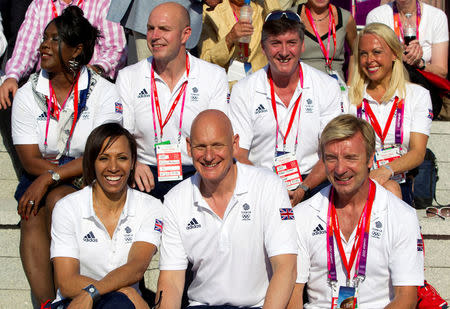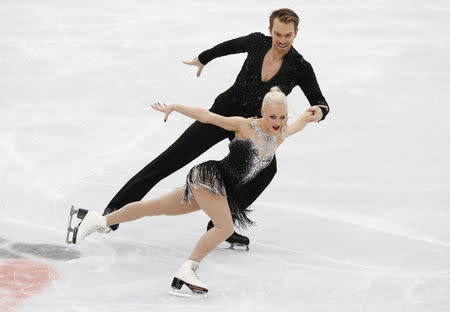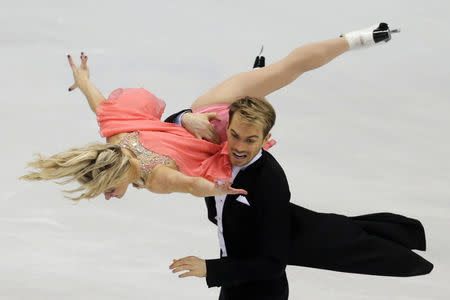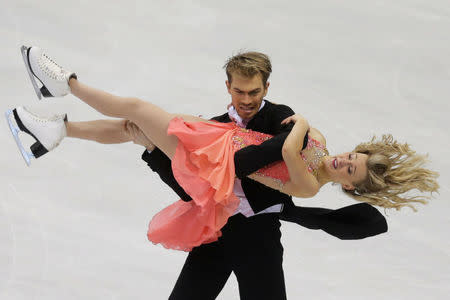Figure skating - Don't write off Britain's chances, says Cousins
By Alan Baldwin
LONDON (Reuters) - Britain's 1980 Olympic figure skating champion Robin Cousins says he will be 'freaking out' in the commentary box when ice dancing duo Penny Coomes and Nick Buckland perform in Pyeongchang.
Patriotism and nerves aside, the 60-year-old who will be at the Games in South Korea as both British team leader and BBC television pundit believes the pair could do better than expected.
Britain has not won an Olympic medal in the sport since 1994, when Jayne Torvill and Christopher Dean took bronze 10 years on from enchanting the nation with ice dancing gold at the 1984 Sarajevo Games.
Coomes and Buckland are not among the favourites, even if UK Sport has set a target of a possible medal and at least a top eight finish.
A veteran of two Olympics, Coomes is also coming back for her third after shattering her knee in eight places in July 2016 and being told she might never skate again.
If the ambitious medal target surprised a few people, Cousins told Reuters it was not unrealistic.
"If you look at things on paper, they won the Olympic qualification with a score that would have been in the top 10 of the world championships. They were seventh in the world championships before the injury.
"The tiniest of mistakes from somebody else and a perfect skate from them... the wind blowing, the right direction, everything going well; It’s not impossible," he said.
"I know that’s how they think. You have to, as an athlete, think of the impossible. Because that’s how stars are born, that’s how things happen."
Coomes and Buckland finished 10th overall in Sochi in 2014.
"A lot of people had written me off, and I wasn't having any of that," Coomes said last year after coming back from injury. "I've worked so hard to achieve my dream and I feel I can do anything in life now."
Cousins, speaking before Coomes and Buckland finished seventh in this month's European championships, said he had "never known anyone so resilient in such a small body".
SCIENCE FICTION
Between 1976, when the late John Curry was triumphant at Innsbruck, and 1984, Britain won figure skating gold at three successive Olympics.
Over the years, Britain has won more medals in figure skating than any other Winter Olympic sport, with 15 in total since London 1908 -- when it featured in the Summer Games -- including five golds.
The next most successful sport for the country is skeleton, with six medals -- four of them since 2002.
Since Torvill and Dean's comeback at Lillehammer in 1994, British figure skating has as good as disappeared through a hole in the ice, however.
Cousins felt one of the reasons was the changing nature of the sport, with some countries training skaters from the age of four or five, and Britain being left behind in funding and facilities.
"There are junior novice Russian 14 or 15-year-olds who can comfortably do a quadruple jump... and it’s not an ugly one, not ‘Oh my God, that was tight’. It’s exquisite, it’s clean, it’s beautifully done," he said.
"A triple Axel was science fiction in my day, it just started to happen. I could do one occasionally. Then the quads. There’s not one quad, there’s five. And now girls are doing them. Not women, girls."
With American men's skater Nathan Chen regularly attempting at least five quadruple jumps in his free skate performances, Cousins added: "It is phenomenal how the sport has evolved."
Cousins expected Pyeongchang to be a thrilling competition, and also remained optimistic about the long-term future of British skating despite past difficulties and different attitudes.
"We have depth, it’s just of a much lower level. And that depth has the ability and talent there," he said.
"It's how do we get that depth stronger so that we can compete internationally, younger, sooner, quicker and then start to say to people we are out there, we do have a full squad. We do have men’s, pairs, ice dancing and (women's) singles.
"Because unfortunately for the qualification for Pyeongchang it's Nick and Penny in the ice dance event and that’s it. But better than nothing."
(Reporting by Alan Baldwin, editing by Pritha Sarkar)

 Yahoo Sport
Yahoo Sport 














































